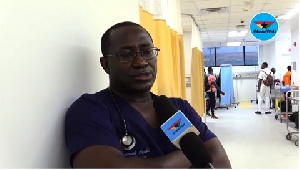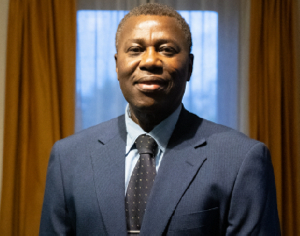The situation where major hospitals like the Korle Bu Teaching hospital are overwhelmed with alarming number of emergency cases while others like the Ridge Hospital are relatively stable is merely due to the ‘poor’ referral system in Ghana’s hospitals, Head of the Emergency Unit at the Accra Regional Hospital, Dr. Emmanuel Ahiable has said.
Speaking on the back of the warning issued by the Korle Bu Teaching hospital Tuesday July 10, 2018 to all hospitals to desist from referring any emergency cases for a period of 48 hours till the hospital’s emergency unit was decongested, Mr. Ahiable noted with worry, the poor state of communication between the country’s hospitals.
Typically, he explained, emergency cases which are ‘manageable’; primary and secondary cases, can be dealt with at the periphery hospitals so that pressure is reduced on the regional hospitals which have the major responsibility of treating patients with tertiary complications.
The lack of communication however he added, has made it such that even the less complicated cases are referred to the major hospitals; Korle Bu and Ridge, leaving the facilities with the burden of having to find beds for their patients; the no-bed syndrome.
“What is happening at Korle Bu is not that Ridge Hospital is referring to Korle Bu. It’s the referral system in Ghana which is not working properly because before a case goes to Korle Bu which is a teaching hospital, it should have gone through periphery hospitals; health centers, polyclinics, district hospitals.
Korle Bu Polyclinic for example is a primary hospital so they can go there, Ridge hospital is a regional hospital so we hardly refer to Korle Bu Teaching Hospitals,” he noted.
He also indicated that the Accra Regional Hospital was fairly stable as far as the no-bed syndrome was concerned, and provision has been made for unforeseen circumstances in the future.
“Things are under control, we’ve put measures in place to contain any crowding at the emergency department. What it means is that we have created extra space like trolleys, wheel chairs and stretchers so that if we get patients more than the number of chairs here, we can put them on it,” he maintained.
No-bed syndrome at Korle Bu
Management of the Korle Bu Teaching Hospital, Tuesday, July 10, said they will not take referrals from other health facilities for a period of 48 hours following a shortage of beds at the Surgical Medical Emergency Unit of the hospital.
The move, they explained, is part of measures to decongest the facility after overcrowding of patients has made it difficult for doctors to work at the SME.
Speaking to journalists a day after the directive, Public Relations Officer of the hospital, Mustapha Salifu bemoaned the situation where minor emergency cases rather than being handled by ‘smaller’ hospitals were transferred to them, putting pressure on the facility.
He stressed the need for an improved referral system and communication between hospitals such that less complicated cases can be handled in the respective district hospitals and health centers and only the dire ones referred to the regional hospitals.
“We need to work more with other hospitals, we need to speak among ourselves as hospitals so that those emergencies that can be handled at the other hospitals, they will detain them and manage them at those facilities so that the real emergencies which will need tertiary level care will then be referred to Korle Bu so that you’ll not take up the beds and then when dire emergencies come, we struggle to create space for some patients”.
The issue of no-bed syndrome in most of the country’s hospitals has been of concern, particularly after news of the death of a 70-year-old man at the LEKMA Hospital in June went rife.
The late Prince Anthony Opoku Acheampong, CEO of Printhony Printing Press in Adabraka, died in his car at the LEKMA hospital after seven health facilities turned him away over claims that there were no beds.
Government has been massively criticized for negligence of its citizens and the Minister of Health following the LEKMA case, issued a warning to ensure no hospital rejects any case with the excuse of no beds.
General News of Friday, 13 July 2018
Source: www.ghanaweb.com













